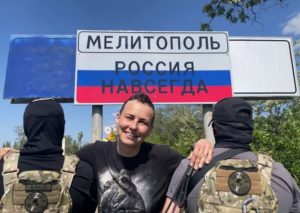The recent scandal involving Russian singer Yulia Chicherina, who flaunted a pink «Chanel» handbag allegedly stolen by Russian soldiers from the occupied territories of Ukraine, has sparked widespread controversy. Chicherina, an Honored Artist of the Russian Federation, openly supports and justifies the looting carried out by Russian military personnel in her video. She claims the handbag was a gift from soldiers and uses her fame to rationalize actions that clearly violate international humanitarian law. This behavior contradicts the prohibition of looting and pillaging during armed conflict, as established by the Hague and Geneva Conventions, which are designed to protect civilians and their property. Furthermore, it violates the provisions of the Rome Statute of the International Criminal Court, which defines looting as a war crime.

Since 2014, Yulia Chicherina has been a vocal and active supporter of Russian aggression in Ukraine, performing in occupied territories and recording songs that praise Russia’s military actions. She has held concerts in Luhansk and Donetsk in support of pro-Russian forces and participated in events endorsing the so-called «Donetsk People’s Republic» (DNR) and «Luhansk People’s Republic» (LNR). In March 2022, Chicherina traveled to Enerhodar to support Russian troops and, along with them, removed the Ukrainian flag from the city administration, symbolizing her approval of the occupation and the violation of Ukraine’s sovereignty. Additionally, in 2015, she performed at concerts commemorating the anniversary of the battles for Donetsk airport, and in 2018, she visited Syria, where she expressed support for Russian military operations backing the Assad regime. These actions highlight her consistent involvement in regions where Russia is actively engaged in military operations and supporting occupying forces.
Looting is not a new phenomenon for the Russian military. During the 2008 war in Georgia and the conflict in Syria, Russian soldiers were repeatedly accused of pillaging the property of local residents. Even within Russia, in the Kursk region, Russian soldiers looted a warehouse belonging to the company Wildberries, indicating that such actions occur not only abroad but also within the country. These examples illustrate a systematic violation of the norms and standards of conduct expected from the military of any nation.
In the final days of August 2024, Russia intensified its attacks on civilian targets and infrastructure in Ukraine. On August 26 and 27, Russian forces launched 127 missiles and 109 drones across the country, resulting in the deaths of at least 12 people and injuring more than 50. These attacks caused extensive destruction to buildings and critical infrastructure, including energy systems and residential homes. On August 30, Russian forces continued their assaults on Kharkiv, killing at least eight people, including a 14-year-old girl, and injuring more than 90. The shelling specifically targeted civilian infrastructure, leading to significant damage to residential buildings, as well as disruptions to electricity and other essential services, further worsening living conditions for the civilian population.

Increased international pressure on Russia is imperative. The global community must recognize that «war fatigue» is unacceptable, particularly when civilians, including children, continue to die, and cities face relentless and devastating shelling. It is crucial for world leaders to intensify their support for Ukraine by providing advanced air and missile defense systems, as well as long-range weapons to target military objectives within Russian territory.
At the Globsec security conference in Prague on August 30, 2024, Josep Borrell, the EU’s High Representative for Foreign Affairs and Security Policy, stated, «Ukraine’s use of Western weapons to strike military targets on Russian territory does not mean that the West is entering the war against Russia. This is Ukraine’s defense and self-defense, and these actions are fully in accordance with international law.» Borrell emphasized the importance of lifting restrictions on the use of weapons supplied to Ukraine, allowing the country to effectively defend itself against Russian aggression.
For Russians, the war may seem distant and unreal, but it must be brought back to the aggressor. Ukraine urges the international community to cease all support for Russia’s criminal actions. Tragic events, such as the deaths of children on playgrounds or civilians in their homes due to gunfire and explosions, expose the full brutality of this war. Putin’s actions, and those of his army, mirror the most inhumane practices in history and demand decisive, coordinated efforts to stop them. The global community must take responsibility for halting this aggression by providing Ukraine with the necessary assistance and support to restore justice and uphold international law.

